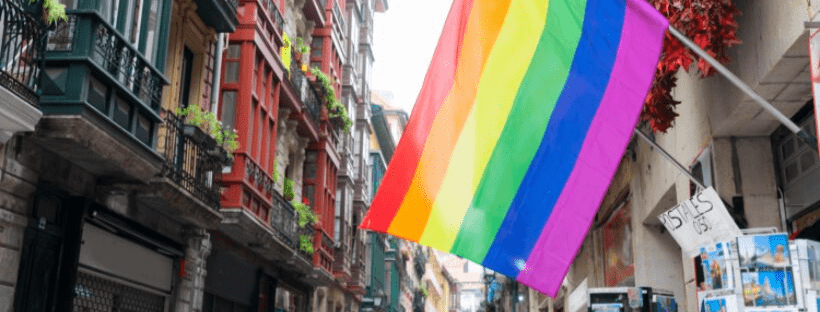
Understanding how the expression of your gender and sexuality might impact your Global Learning experience is an important part of the process when preparing to study abroad. Cultures around the world can vary greatly in their perspectives, social expectations, and opinions relating to the complex concepts of gender and sexual identities. Because of this, it is important to research the culture of your destination country to better prepare for any cultural differences you may expect or to learn about any health or safety issues specific to that country that you might encounter.
This section provides a starting point for your study abroad preparations. You can follow up with the resources provided here and with your Global Learning advisor. Staff at the UCSC Lionel Cantú Queer Resource Center can also provide guidance to LGBTQ+ students on study abroad destinations and international travel.
Trans Identities & Gender Non-Conforming Identities Abroad
Understand the Legal and Social Environment
Unfortunately, there are some countries where one’s gender identity and/or sexuality may be legally forbidden or prompt violence or discrimination from which there are few, if any, legal protections. For this reason, it is highly recommended that you research your host country for warning signs that you may need to exercise caution when there or consider attending another program if you’re not comfortable with the level of personal risk you may face. There are several resources that provide a good foundation for learning about your destination country, including:
- Equaldex.com, a website dedicated to tracking the LGBTQ+ legal and social climate across all countries
- The Pew Research Center global surveys on legal status and social attitudes in relation to LGBTQ+ identifying people.
- International Lesbian, Gay, Bisexual, Trans and Intersex Association (ILGA World)
Identify Safe Spaces
When planning for your study abroad experience, it is appropriate to consider what safety net may be in place for you abroad and how you may find or create community for yourself. Your investigations into the legal and social environment of your host country and city are a good starting place for what you need to be concerned about and how you might identify the resources you need. As an example, you should consider the following questions.
- Where can I go in the event of a traumatic incident or episode for support?
- Does contacting local law enforcement present an additional risk to my safety?
- Are there LGBTQ+-friendly social spaces in the host city?
- Are there local LGBTQ+ organizations that can provide support and assist in advocacy?
The Trevor Project Hotline is accessible while you are abroad and may be an excellent support resource. The Trans Lifeline is a resource where you can connect with a trans/non-binary peer for support.
Health Care While Abroad
In some cases, you may need to identify a provider for ongoing healthcare needs or to travel with medications that may be of limited availability in some countries. When considering possible healthcare needs, the following should be taken into consideration:
- How does the healthcare system in my host country differ from what I’m familiar with?
- Are there legal limitations on gender-affirming care in place?
- Are there locally available mental health support services I can access?
Equaldex.com provides limited information about the legality and availability of gender-affirming care for most countries, although it would be best to make inquiries directly to in-country advocacy organizations if you have specific concerns or questions. UC travel services provider AXA may also be able to assist in identifying local providers who can provide gender-confirming care, and can assist in arranging ongoing care abroad if necessary. Students studying on UCSC-sponsored programs can also access Lyra Health mental health support services, including ongoing therapy, coaching, and self-care resources. See the Global Engagement International Travel section for more information about preparing to travel with medication.
Official Documentation
The name and gender used on official documents must match what is listed in your passport. Your full legal name must be provided, even if it doesn’t match your identity. Trans travelers may consider having their passports and other IDs changed to reflect their identifying gender. The Transgender Law Center and Transequality.org provide information on specific passport requirements for name change, gender change, two-year passports, and which forms to use to do so.
The information below is accurate as of 2/20/2025. Check the U.S. Department of State website for up-to-date information.
A gender X option for US passports was created in April 2022, by the US Department of State. The issuing of these passports was suspended on January 22, 2025, as a result of a Presidential Executive Order to officially recognize two genders.
U.S. DOS further clarified this policy on February 10, 2025, with a web page titled Sex Marker in Passports by reaffirming that X gender passports will no longer be issued, and only passports with an M or F sex marker will be issued.
Additionally:
- Only passports with an M or F sex marker that matches biological sex at birth will be issued.
- X gender passport applicants who have already submitted an application can expect delays and might receive a letter or email requesting more information.
All passports – including those with an X marker or those listing a sex different from your sex at birth – will remain valid for travel until their expiration date.
Additional Resources
- Advocates for Trans Equality Travel & Airport Security
- U.S. State Department LGBTQ+ Travelers page
- Pre-departure Elective Session Slides: Intersectionality Abroad: Navigating Your LGBTQIA+ Identity in Your New Community
- Equaldex.com
- International Lesbian, Gay, Bisexual, Trans and Intersex Association ILGA
- Name and gender changes on California and federal documents
